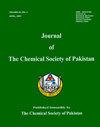Effects of Selected Metal Chlorides on the Micellization Parameters of Cetrimonium Bromide at Different Temperatures
IF 0.5
4区 化学
Q4 CHEMISTRY, MULTIDISCIPLINARY
Journal of the chemical society of pakistan
Pub Date : 2022-01-01
DOI:10.52568/001125/jcsp/44.05.2022
引用次数: 0
Abstract
The pre-modification of surfactant counterions using transition metal salts provides a means to activate the interface using corresponding properties of metal ions. In this work, a cationic surfactant cetyltrimethylammonium bromide (CTAB) was modified by pre-mixing metal chlorides (FeCl3, CuCl2 and ZnCl2) and CTAB in 1:1 molar ratio using methanol as solvent. As a result, FeCl3, CuCl2 and ZnCl2 were added as [FeCl3Br]-1, [CuCl2Br]-1 and [ZnCl2Br]-1 respectively acting as counter anions (CAs) instead of bromide anion. Hence CTAB was called CTAF, CTAC and CTAZ in order of added CAs i.e., [FeCl3Br]-1, [CuCl2Br]-1 and [ZnCl2Br]-1 respectively. The effect of these metal chlorides on the micellar behaviour of CTAB was investigated using conductivities of their different solutions. Furthermore, the critical micelle concentration (CMC) as well as the degree of counterion binding were considered at 25.0, 30.0, 35.0, 40.0 and 45.0 and#176;C 0.1 and#176;C. The analysis of results revealed that incorporation of metal cations reduces the CMC values in the order CTAF CTAZ CTAC CTAB. Change in entropy (S), enthalpy (H) and free energy (G) were calculated to understand the thermodynamics of micellization under the circumstances. The aim of this study is to improve the understanding regarding the presence of transition metals in micellization process as well as the possibility of their interactions with Bromide counterions and possibility of the formation of complex counter-anions.不同温度下金属氯化物对西曲溴铵胶束化参数的影响
用过渡金属盐对表面活性剂反离子进行预改性,提供了一种利用金属离子的相应性质激活界面的方法。以甲醇为溶剂,将金属氯化物(FeCl3、CuCl2和ZnCl2)与CTAB以1:1的摩尔比预混合,对阳离子表面活性剂十六烷基三甲基溴化铵(CTAB)进行改性。结果,FeCl3、CuCl2和ZnCl2分别以[FeCl3Br]-1、[CuCl2Br]-1和[ZnCl2Br]-1的形式加入,代替溴化物阴离子作为反阴离子(CAs)。因此CTAB按照添加的CAs依次称为CTAF、CTAC和CTAZ,分别为[FeCl3Br]-1、[CuCl2Br]-1和[ZnCl2Br]-1。利用不同溶液的电导率研究了这些金属氯化物对CTAB胶束行为的影响。此外,在25.0、30.0、35.0、40.0、45.0和#176;c0.1和#176;C时考虑临界胶束浓度(CMC)和反离子结合度。分析结果表明,金属阳离子的掺入降低CMC值的顺序为CTAF CTAZ CTAC CTAB。通过计算熵(S)、焓(H)和自由能(G)的变化来了解在这种情况下胶束化的热力学。本研究的目的是提高对胶束过程中过渡金属的存在及其与溴化物反离子相互作用的可能性和形成复杂反阴离子的可能性的认识。
本文章由计算机程序翻译,如有差异,请以英文原文为准。
求助全文
约1分钟内获得全文
求助全文
来源期刊
CiteScore
1.30
自引率
14.30%
发文量
41
审稿时长
3.4 months
期刊介绍:
This journal covers different research areas in the field of Chemistry. These include; Analytical Chemistry, Applied Chemistry, Biochemistry, Environmental Chemistry, Industrial Chemistry, Inorganic Chemistry, Organic Chemistry and Physical Chemistry. The journal publishes full length articles and Reviews from researchers in academia in addition to featuring comments. Chemical Research presents short, concise and critical articles offering easy-to-read overviews of basic research and applications in all areas of chemistry.

 求助内容:
求助内容: 应助结果提醒方式:
应助结果提醒方式:


